The Case Section
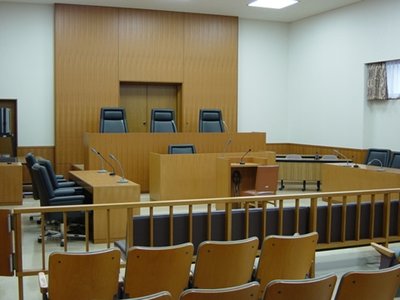
NOTICE
The purpose of this site does not include any form of retribution. Also, for privacy reasons the defendants’ names along with certain other names have been omitted from all public documentation contained herein.
This section has been included to help raise awareness about some of the problems in litigation cases. I have provided official documents from my own case to help serve as an example. I hope this will help educate medical workers, legal workers and the general public.
Basic History
Feb 2003: Preparations.
Feb 2006: Mediation (initially by myself) at Tokyo Summary Court.
Jun 2007: Tokyo District Court.
Sep 2008: Returned to Japan again to testify (no accommodation, job or money).
Sep 2009: Tokyo High Court.
May 2011: Appeal to Supreme Court (by myself in midst of 3/11 mega-quake and Fukushima nuclear disaster, jobless, homeless).
Oct 2011: Supreme Court decision (case closed).
Main Evidence
Patient files and DSM-IV-TR diagnostic criteria for drug (substance) dependency.
Main Arguments
Most inappropriately, the central argument became a case of whether I had Autonomic Nervous Disorder (AND) or iatrogenic BZ dependency.
Definition
AND is an umbrella term commonly used in Japan to describe: (A) Psychosomatic symptoms caused by a variety of stress / anxiety conditions, or (B) Any other condition where the autonomic nervous system acts in a way that produces symptoms, especially in cases where they are not sure of the cause.
NB: This argument was totally illogical because my entire nervous system had become hyperactive as a result of BZ dependency and withdrawal reactions (See Autonomic Nervous Disorder).
Top of Page
Medical Reports
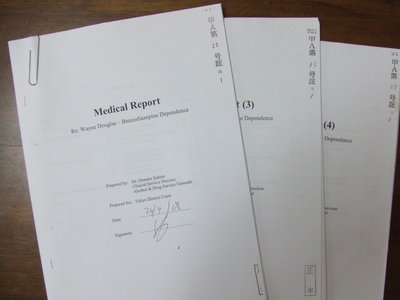
- Clarifies patient history including patient profile, substance / prescription history and symptoms’ history.
- Shows how DSM-IV-TR diagnostic criteria for drug dependency were applied.
- Explains how the dependency diagnosis was made.
Top of Page
- This report has not been included in this website because it doesn’t add anything significant to the other reports.
Top of Page
- Shows how the DSM-IV-TR diagnostic criteria for drug dependency were applied to the actual evidence, with a focus on the patient files from Japan (translations).
- Shows how arguments were backed by expert opinions (literature) from Prof. Ashton.
- Gives a detailed explanation about differentiating between mere symptoms of stress and those of doctor induced drug dependency.
- Clarifies consistency between content of reports and the evidence (Patient files etc).
Top of Page
- Shows how the DSM-IV-TR diagnostic criteria for drug dependency were applied to the actual evidence, with a focus on the patient files from New Zealand.
- Shows how arguments were backed by expert opinions (literature) from Prof. Ashton.
- Gives detailed information based on the evidence about prescribing issues, informed consent, monitoring etc.
Top of Page
- Outlines reasons why both the diagnosis and treatment of the prescribing doctor were wrong.
Top of Page
Statements
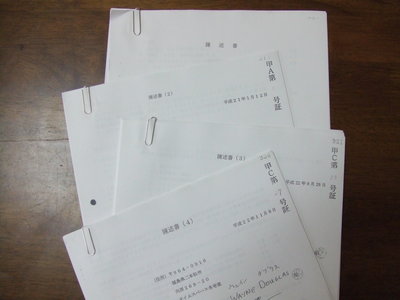
- Gives an account of how the state of dependency evolved in relation to the treatment history.
Top of Page
- Addresses a number of general discrepancies including an issue over prescription shortfalls where I gave an entire breakdown accounting for every single dose for a course of medication prescribed 10 years prior.
- Contains a challenge from me to the defense – they never accepted.
Top of Page
- Gives a summary of key evidence as a last ditch attempt by me to convince the High Court judge of our case for dependency.
- The idea was to try and make it impossible for the court to judge against me without being unfair. I think I achieved that.
Top of Page
- Shows a comparison between my health before and during the dependency.
- My mother explains how she couldn’t recognize me at the airport upon my return to New Zealand.
- Shows the effects my dependency had on my elderly mother.
Top of Page
- Shows a comparison between my health before, during, and after the dependency problem from a friend who knew me well during each of those times.
Top of Page
Verdicts
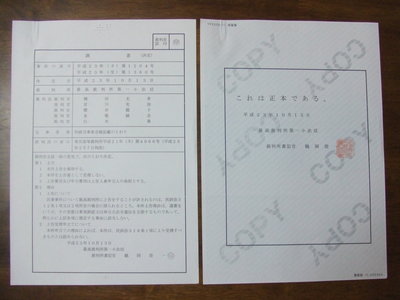
- Shows the reasons why the Supreme Court of Japan dismissed my appeal. Namely, it was not deemed to have met the requirements for “constitutional infringement.”
Top of Page
Appeal
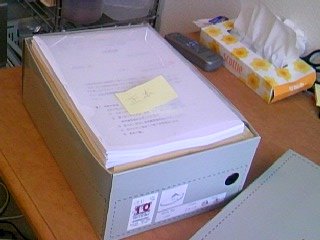
A shoebox full – 9 sets of appeals & appendices all in Japanese. Prepared by me alone whilst evacuating from the Fukushima nuclear disaster following the mega-quake in March 2011.
- Highlights some of what I felt were injustices of the lower courts and the reasons why I appealed to the Supreme Court of Japan.
- I wrote this alone without any representation (in Japanese) during the midst of the 3/11 disaster as I moved between evacuation points during aftershocks, radiation fallout and rotational blackouts – many notes were taken by candle light.
Top of Page
Issues
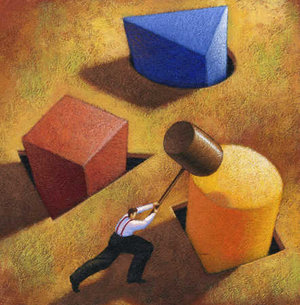
- Shows the main diagnostic issues which were raised in my case, along with common misconceptions displayed among concerned parties, together with expert verifications to the contrary.
Top of Page
Damages

- Shows the actual amount of losses and damages in my case based on official court claim forms, receipts etc.
Top of Page
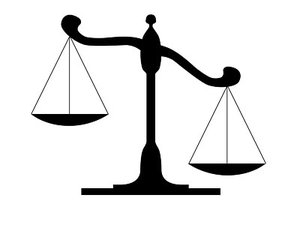
What do the world leading experts say?
Professor Heather Ashton
Nearly all Wayne Douglas’s symptoms during benzodiazepine treatment, dosage reduction and withdrawal (recorded in Dr. Judson’s report) are due to dependence and symptoms of autonomic overactivity, which is common in these circumstances.
There was no evidence in the report of autonomic nervous disorder prior to taking benzodiazepines, apart from a mild episode of physiological stress which settled spontaneously after Mr. Douglas changed jobs in March 2000.
The episode of vertigo in May 2000 was undoubtedly due to a vestibular neuronitis which is usually caused by a virus.
“…there was no question that you had ..” I meant this to mean that it was out of the question that you had an autonomic nervous disorder prior to taking benzos i.e you could not have had it and it does not merit further consideration/is not an issue (See all of Prof. Ashton’s comments).
Professor Heather Ashton, Emeritus Professor of Clinical Psychopharmacology, University of Newcastle upon Tyne, England.
Dr. Hirokuni Beppu
It is clear that the Judges intentionally used a misleading medical term (Autonomic Nervous Disorder) to create confusion. Even lay-people would know that.
The judges intended to construct a loss from the outset. They pretended to hear from both sides fairly and impartially. Then delivered their forgone conclusion.
They were all well too aware of the contradictions in their line of reasoning. They no doubt began with the conclusion first. Then constructed the judgment by twisting the logic to reach the desired conclusion. It was all just a play with words.
It is obvious they only focused on so-called evidence that is convenient while planting various quotes, such as “Expert so-and-so says this and that.” “The drug package inserts say this and that.”
Then they continue along the lines “So there was no problem with the prescriptions.” “The plaintiff was suffering from autonomic nervous disorder or stress from living in Japan that might have caused such symptoms.”
It is an atrocious verdict. Just reading it is sickening.
Dr. Hirokuni Beppu (Medwatcher Japan), Tokyo University School of Medicine, Former Hospital Director, Pharmaceutical Analyst and Researcher, Editor for the International Journal of Risk and Safety in Medicine, Editor for the British Medical Journal, Founder and Vice Chair of Medwatcher Japan, Director of DIPEx-Japan, Fellow of The Japanese Society of Clinical Pharmacology and Therapeutics, Honorary Fellow of the Japan Pharmacoepidemiology Society, Author of the book, When Doctors Question Medicine, Translator of the book, The Use of Essential Drugs, by the World Health Organization and The HPV Vaccine On Trial, Chief Editor of The Ashton Manual in Japanese.
Professor Malcolm Lader
(World leading authority in benzodiazepine litigation cases)
Dear Wayne,
You were certainly subject to judicial mishandling of your case! I greatly sympathise with you.
Yours sincerely,
Malcolm Lader
Professor Malcolm Lader, O.B.E., LL.B., Ph.D., M.D., D.Sc., F.R.C. Psych., F. Med Sci. Emeritus Professor of Clinical Psychopharmacology, King’s College London.
Top of Page
Justice or Not?
- I think the ultimate discrepancy in the High Court Verdict is that the Judge failed to rule out the fact I was dependent in terms of the DSM-IV-TR (worldwide recognized diagnostic standard) which formed the overall basis for the entire case.
- Although the Judge addressed two of the criteria in tolerance (criteria 1) and withdrawal (criteria 2), albeit without any direct reference to the DSM-IV-TR itself, he completely failed to address the other three that were being claimed – effectively leaving them standing.

- Our key witness was twice denied the opportunity to testify – once by the Tokyo District Court and once by the Tokyo High Court.
- The Tokyo District Court judge raised an issue in the defense's favour only after proceedings had ended totally denying us any opportunity for rebuttal.
- The Tokyo High Court judge chose to use the package inserts from the drug companies to determine the amounts at which benzodiazepines could be deemed addictive, completely ignoring the extensive evidence (literature, expert opinions etc) submitted to the contrary.
- The courts made no issue over the prescribing doctor diagnosing me with one thing and treating me with drugs used for something completely different.
-
More than half the applied DSM-IV-TR diagnostic criteria for dependency were not addressed in the verdict.
- The presiding High Court judge was replaced half way through proceedings by a judge who knew absolutely nothing about the case or benzodiazepines before the verdict was delivered.
“If any drug over time is going to just rob you of your identity [leading to] long, long term disaster, it has to be benzodiazepines.”

Dr John Marsden,
Institute of Psychiatry, London
November 1, 2007
“Benzos are responsible for more pain, unhappiness and damage than anything else in our society.”

Phil Woolas MP,
Deputy Leader of the House of Commons,
Oldham Chronicle, February 12, 2004
“The benzodiazepines are probably the most addictive drugs ever created and the vast army of enthusiastic doctors who prescribed these drugs by the tonne have created the world's largest drug addiction problem.”

The Drugs Myth, 1992
“If there's a pill, then pharmaceutical companies will find a disease for it.”

Jeremy Laurance,
The Independent, April 17, 2002.
“To rely on the drug companies for unbiased evaluations of their products makes about as much sense as relying on beer companies to teach us about alcoholism.”

Marcia Angell MD
(Former) Executive Editor New England Journal of Medicine
“It is more difficult to withdraw people from benzodiazepines than it is from heroin.”

Professor Malcolm H Lader
Institute of Psychiatry London
BBC Radio 4, Face The Facts
March 16, 1999
“Withdrawal symptoms can last months or years in 15% of long-term users. In some people, chronic use has resulted in long-term, possibly permanent disability.”

Professor C Heather Ashton
DM, FRCP,
Good Housekeeping, 2003
“Clearly, the aim of all involved in this sorry affair is the provision of justice for the victims of tranquillisers.”

The Ashton Manual contains expert advice on benzodiazepines and how to withdrawal written by world renowned expert Prof. Heather Ashton.
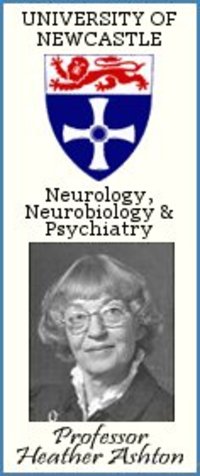
The withdrawal schedules provided in the manual are only intended as "general guides". Each person's experience of withdrawal is unique and the course of withdrawal depends on many factors.
What are benzos for again?
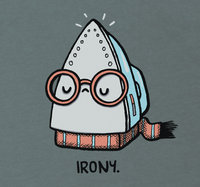
The only time I’ve ever needed to visit a psychologist in my life was AFTER (wrongfully) being prescribed benzodiazepines…

This section focuses on some of the apparent injustices of the Japanese courts in my case. To help highlight these, some parts of this section include cross-referencing between the High Court Verdict and the Dependency Reports which were all based on the official evidence and the DSM-IV-TR diagnostic criteria for dependency.
Both the High Court and Supreme Court Verdicts dismissed my case completely (100%), despite the comprehensive medical reports, expert opinions, and credible evidence...
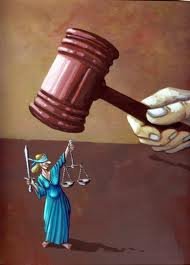
Who's protecting society (the tax payers) whose money they receive as salary to protect the public?
“Benzodiazepine addiction is a terrible affliction; these people are not drug addicts but they have become hooked on repeat prescriptions of tranquillisers.”

PM David Cameron
October 23, 2013








